Exploring WebAssembly (WASM)
Compiling to WebAssembly
Emscripten Compiler
In this lesson, you'll learn how to use Emscripten—the powerful compiler toolchain that converts C and C++ into high-performance WebAssembly (WASM) and JavaScript. Emscripten enables both browsers and server environments (like Node.js) to run native code with near-native speed, making it ideal for games, graphics libraries, and utility ports.
Why Emscripten Matters
- Brings established C/C++ applications to the Web platform
- Enables game engines, graphics libraries, and frameworks to run in browsers
- Supports modern optimizations and a simulated file system
Mozilla and Epic Games showcased Unreal Engine 3 and 4 running in Firefox, illustrating WebAssembly’s potential for gaming.
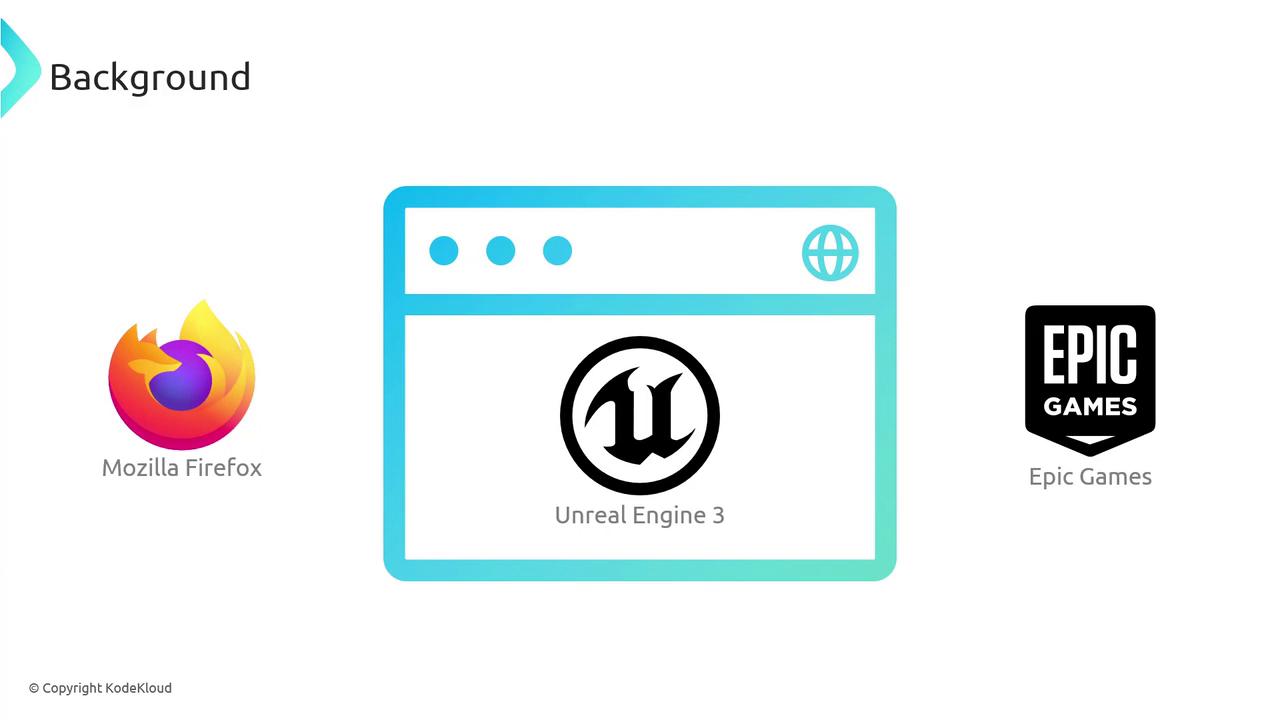
Unity joined the movement, announcing “WebAssembly is here” to accelerate game performance on the web.
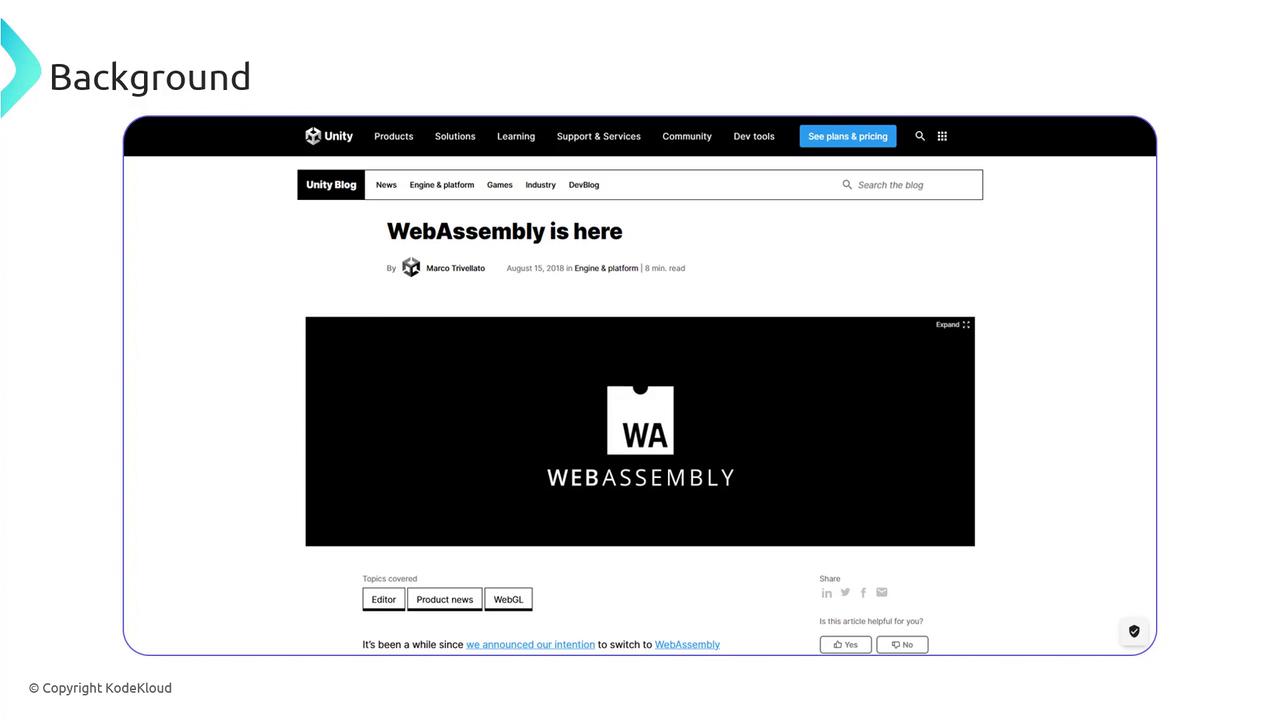
Emscripten in Action
Emscripten powers ports of:
| Category | Examples |
|---|---|
| Game Engines | Unity, Nebula 3, GeoGram |
| Graphics Libraries | OpenGL ES 2.0, ImGui |
| Frameworks & Apps | PyQt, .NET Blazor |
| Utilities & Emulators | Classic emulators, image tools, and more |
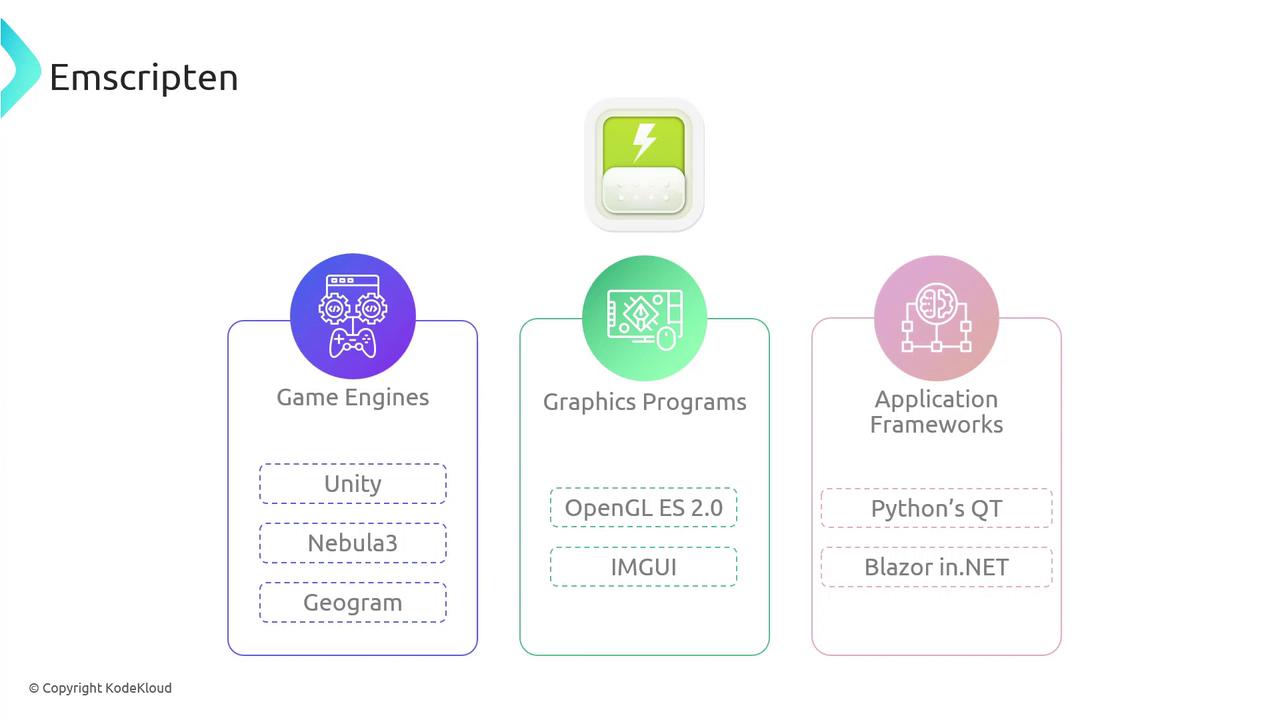
A Closer Look at Emscripten
Emscripten integrates the LLVM toolchain—Clang and LLVM—plus Google’s Closure Compiler to output optimized WebAssembly modules and JavaScript glue code.
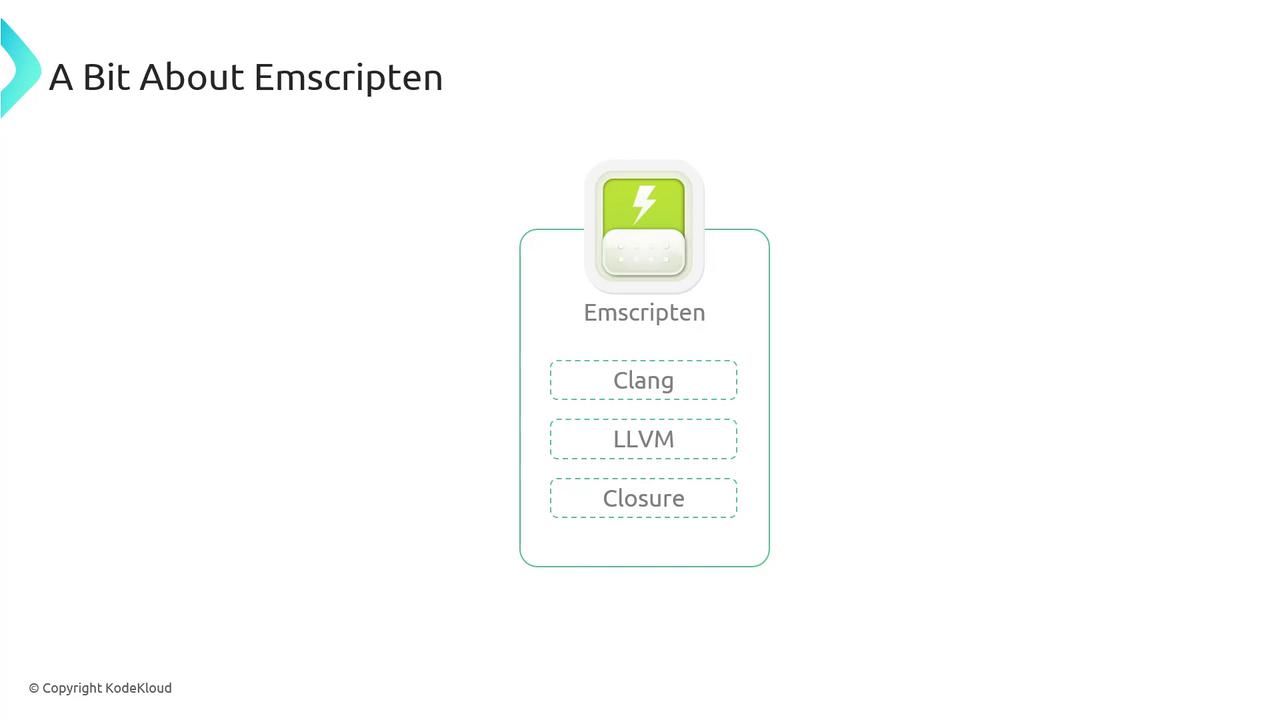
Invoke the frontend emcc just like gcc or clang:
# Compile C/C++ files
emcc [options] file...
# Display help and version
emcc --help
emcc --version
By default, emcc generates:
*.wasm— WebAssembly binary*.js— JavaScript loader
Installation Options
Choose the approach that suits your workflow:
| Method | Description | Quick Start |
|---|---|---|
| Docker | Run Emscripten without local install | docker run --rm -v $(pwd):/src emscripten/emsdk emcc ... |
| EMSDK (Local) | Full SDK with version management (Linux/Win/macOS) | See Emscripten SDK Downloads |
# Docker example:
docker run --rm -v $(pwd):/src -u $(id -u):$(id -g) emscripten/emsdk
# Inside container:
emcc helloworld.cpp -o helloworld.js
Note
For local development, install the Emscripten SDK (EMSDK). It bundles emcc, LLVM, Node.js support, and utility scripts.
Verifying Your Installation
Ensure emcc is on your PATH and run:
emcc -v
Expected output:
emcc (Emscripten gcc/clang-like replacement + linker emulating GNU ld) 3.1.45-git
clang version 18.0.0 (...)
Target: wasm32-unknown-emscripten
...
If you encounter missing-tool warnings, refer to the official docs for troubleshooting.
Your First WebAssembly Program
- Create
hello_world.c:
#include <stdio.h>
int main() {
printf("Hello, World!\n");
return 0;
}
- Compile with Emscripten:
emcc hello_world.c
This yields:
a.out.wasm— WebAssembly modulea.out.js— JS loader
- Run in Node.js:
node a.out.js
# → Hello, World!
JavaScript Fallback
Force pure JavaScript output for environments without WASM:
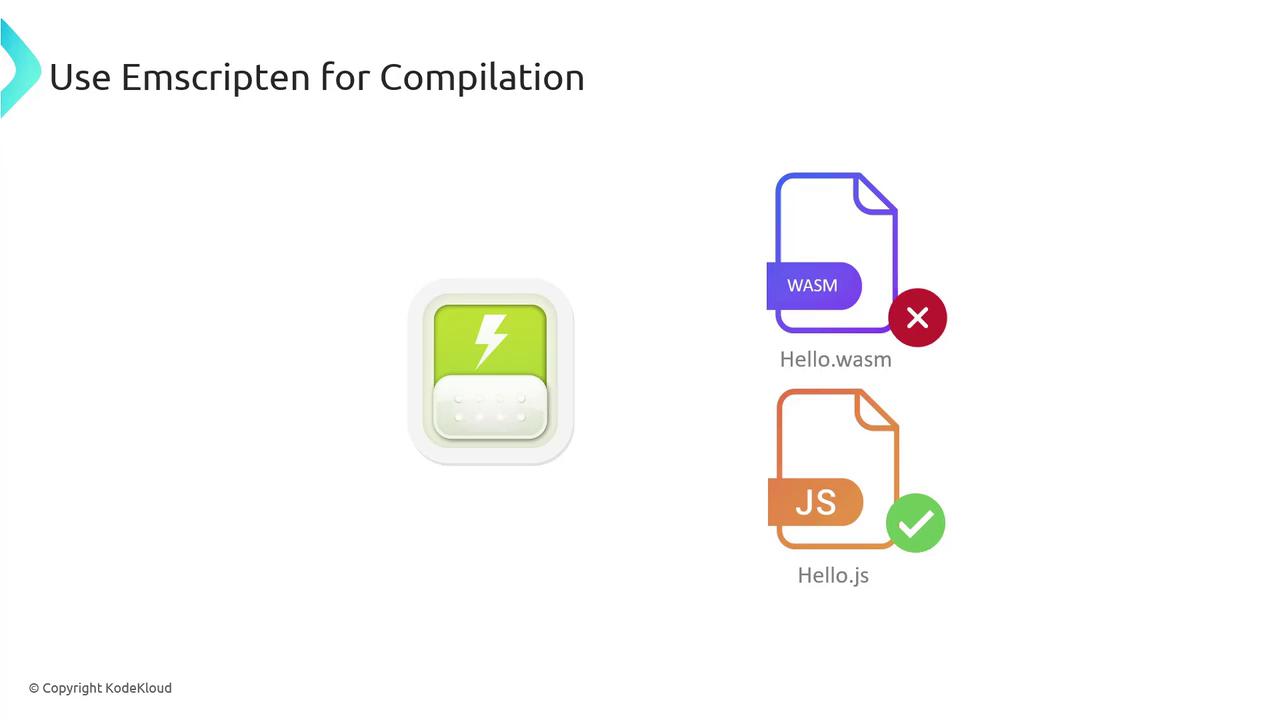
emcc hello_world.c -s WASM=0
Creating an HTML Wrapper
Generate an HTML file that auto-loads your module:
emcc hello_world.c -o hello.html
Open hello.html in a browser (or via a local server) to see “Hello, World!” rendered on the page.
Enforcing Strict Mode
Use -s STRICT=1 to catch deprecated or unsafe code patterns.
Warning
Strict mode treats deprecated patterns as errors. Ensure your code adheres to modern C/C++ standards.
// hello.cpp
#include <iostream>
#include <stdlib.h>
int main() {
char *buffer = (char*)malloc(10); // Deprecated in C++
if (!buffer) return 1;
std::cout << "Memory allocated." << std::endl;
free(buffer);
return 0;
}
emcc hello.cpp -o hello.html -s STRICT=1
You may see warnings like:
Warning: ‘malloc’ is not recommended in modern C++. Use ‘new’ instead
Warning: inclusion of the C header file <stdlib.h> is deprecated in STRICT mode
Exporting Custom Functions
By default, only main is exported. Use -s EXPORTED_FUNCTIONS to expose additional functions:
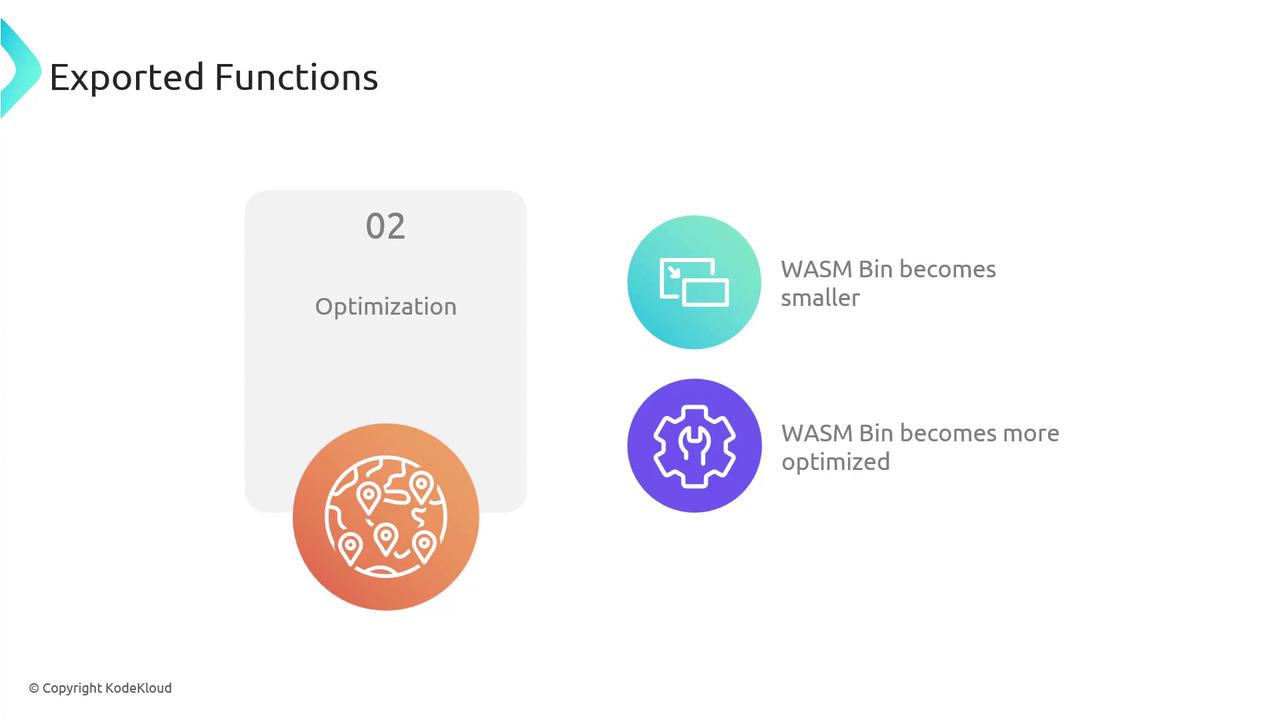
#include <emscripten.h>
EMSCRIPTEN_KEEPALIVE
int multiplyNumbers(int a, int b) {
return a * b;
}
emcc multiplyNumbers.c -o multiplyNumbers.js \
-s EXPORTED_FUNCTIONS="['_multiplyNumbers']"
Now call it in JS:
Module._multiplyNumbers(3, 4); // 12
Simulated File System
Emscripten provides a virtual file system so your C/C++ code can use standard I/O in the browser:
![]()
test/hello_world_file.cpp:
#include <stdio.h>
int main() {
FILE *file = fopen("hello_world_file.txt", "rb");
if (!file) {
printf("cannot open file\n");
return 1;
}
int c;
while ((c = fgetc(file)) != EOF) putchar(c);
fclose(file);
return 0;
}
Preload data at compile time:
emcc test/hello_world_file.cpp -o hello.html \
--preload-file test/hello_world_file.txt
Serve hello.html via HTTP to view the file contents in the browser.
Build Optimizations
Fine-tune performance with standard optimization levels:
emcc -O1 hello_world.cpp # safe transformations
emcc -O2 hello_world.cpp # balanced speed and size
emcc -O3 hello_world.cpp # aggressive inlining & loop unrolling
- O1: removes assertions, minimal size reduction
- O2: faster runtime with code replacements
- O3: extensive optimizations for release builds
Further Reading & References
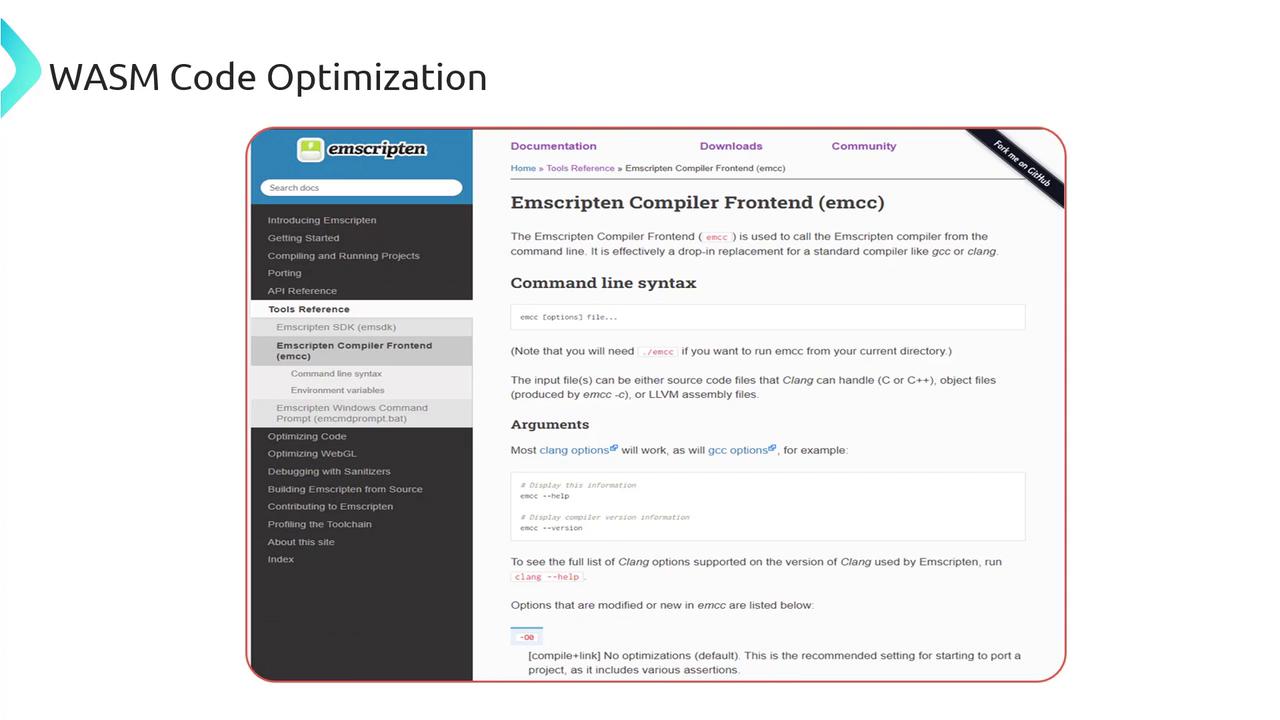
Watch Video
Watch video content